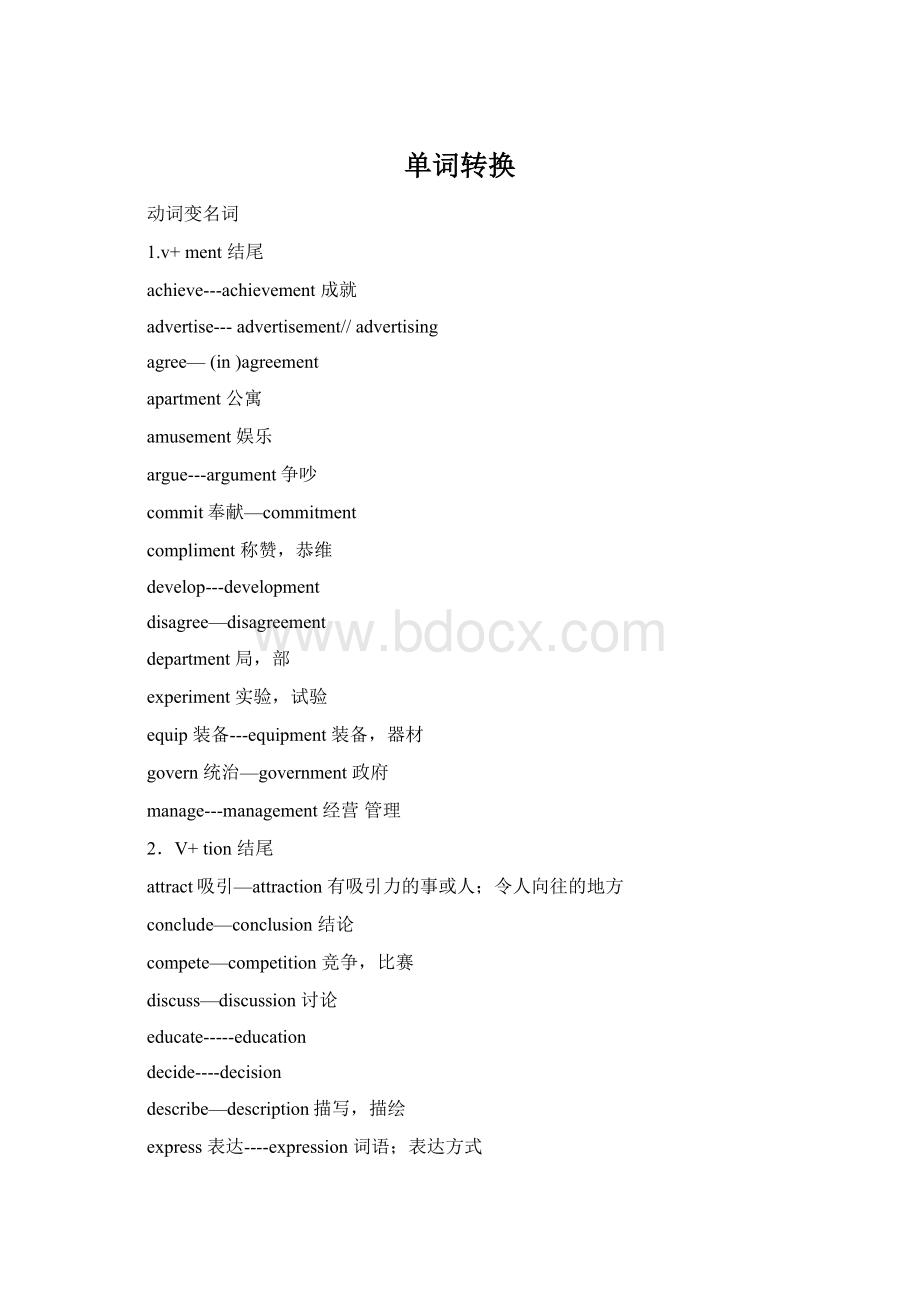单词转换.docx
《单词转换.docx》由会员分享,可在线阅读,更多相关《单词转换.docx(70页珍藏版)》请在冰豆网上搜索。

单词转换
动词变名词
1.v+ment结尾
achieve---achievement成就
advertise---advertisement//advertising
agree—(in)agreement
apartment公寓
amusement娱乐
argue---argument争吵
commit奉献—commitment
compliment称赞,恭维
develop---development
disagree—disagreement
department局,部
experiment实验,试验
equip装备---equipment装备,器材
govern统治—government政府
manage---management经营管理
2.V+tion结尾
attract吸引—attraction有吸引力的事或人;令人向往的地方
conclude—conclusion结论
compete—competition竞争,比赛
discuss—discussion讨论
educate-----education
decide----decision
describe—description描写,描绘
express表达----expression词语;表达方式
graduate毕业—graduation
operate操作,动手术—operation
organize----organization
instruct—instruction指导,介绍
invent—inventor/invention
invite—invitation
inspire---inspiration灵感,鼓舞人心的---
pollute----pollution污染
predict---prediction预言
pronounce---pronunciation
resolve决心-----resolution决心
permit允许-----permission
suggest-建议,暗示--suggestion
solve解决-----solution解决方法
3.V+ance结尾
appear—appearance外貌,出现
perform----performance演出
4.V+ing结尾
bathe洗澡---bathing
end结束----ending结尾,结局
train训练---training
mean----meaning意义
say-----saying谚语
5.V+其他
beg(乞讨)—beggar乞丐
behave行为,举止----behavior
know---knowledge
fly—flight飞行
heat加热---heat热量
hit撞击------hit轰动一时的人或物,碰撞
mix混合-----mixture混合物
press按,压—pressure压力
sit-----seat座位
succeed--success
tour在-----旅游,在-----作巡回演出直接+地点tourChina---tour旅游/tourist游客
名词变形容词
1名词+y
anger生气-----angry
hunger---hungry
fog—foggy有雾的
fur----furry毛皮的
guilt罪恶---guilty内疚的
health---healthy
luck---lucky
cloud---cloudy
wind—windy
rain---rainy
snow---snowy
sun—sunny
tourist------touristy游客多的
business---busy
salt盐---salty咸的
shine---shiny发亮的
silk丝绸—silky丝绸般的
sleep---sleepy昏昏欲睡的
taste口味,品味------tasty甜的
2.名词+ed
balance–balanced平衡的
spot斑点,地点----spotted有斑点的
talent-----talented有天赋的
organized有组织的
disgusted厌恶的
offended生气的
crowded拥挤的
polluted被污染的
pleased高兴的
3.名词+ful/less
meaning—meaningful有意义的
care—careful/careless小心的;粗心的
help---helpful/helpless
home—homeless无家可归的
colour---colourful
pain疼痛---painful痛苦的
use---useless/useful
thank—thankful充满感激的
peace和平----peaceful平静的,宁静的
playful顽皮的,爱玩耍的
4.名词+able
adjustable可调整的
comfort---comfortable
knowledge---knowledgeable
suit一套-----suitable合适的
5.名词+ous
enormous巨大的
danger—dangerous
mystery神秘-----mysterious神秘的
6.ce变t
confidence----confident
difference---different
7.al结尾
medicine药----medical医学的
music---musical
nature---natural自然的
person---personal(私人的)
nation—national国家的
education---educational有教育意义的
tradition----traditional传统的
origin起源---original新颖的;独创的
8.名词+ly
friend—friendly
live---lively活跃的,有生气的
love—lovely可爱的
9.+en结尾
wood—wooden木制的
wool—woolen羊毛的
10.其他
energy精力---energetic
fool傻子—foolish愚蠢的
freedom自由—free空的,免费的
height高度—high
illness疾病---ill
love—loving慈爱的
death---dead
pleasure---pleasant/pleased
popularity流行性—popular
pride---proud
scientist----scientific科学的
方位的词表达名词—形容词
East—eastern
West—western
South—southern
North---northern
InthewestofChina
InthewesternpartofChina
四大洲名词-----形容词
Asia亚洲–----Asian
Africa非洲-----African
Europe欧洲-----European
America美洲-----American
形容词变副词
1.形容词+ly
bad—badly
bright—brightly明亮地
casual—casually随意地
clear—clearly清楚地
complete—completely完全
correct---correctly正确地
final--finally
fortunate—fortunately幸运地
general—generally一般来讲
loud—loudly
particular特殊的,独特的—particularly
polite—politely
proper合适的-,恰当的---properly
main------mainly主要地
most多数-----mostly多半,大多数
normal---normally正常地
quick—quickly
quiet—quietly轻轻地,安静地
real—really
recent最近的----recently最近;近来
hard难的;努力地---hardly几乎不
late迟的—lately最近;近来
sad--sadly
slow---slowly
special—specially专门,特殊地
specific---specifically特定地,明确地
strong—strongly坚决地,强烈地
sudden—suddenly突然
usual—usually
2.以le结尾的去e+y
comfortable---comfortably
gentle—gently
possible---possibly
simple----simply仅仅;只;简单地
terrible---terribly
3.辅音字母+y变ily
easy—easily
heavy—heavily
happy--happily
4.特殊
good—well好地well身体健康的,井
true—truly
名词---形容词—副词
beauty美,美人—beautiful—beautifully
care—careful—carefully
care—careless—carelessly
difference---different---differently
happiness—happy—happily
hunger—hungry--hungrily
health—healthy—healthily
luck—lucky—luckily
noise—noisy—noisily
pride—proud—proudly骄傲地
sadness—sad—sadly
safety安全;安全的地方—safe—safely
silence—silent---silently默默地
success—successful—successfully
truth—true—truly
unluck—unlucky—unluckily
wonder奇迹—wonderful—wonderfully
既是形容词又是副词
earlygetupearly
anearlytrain
latebelateforclass
comelateforschool
deepdivedeepintothesea
aholedeeplarge
highjumphigh;
ahighmountain
hardahardquestion;ahardstone
workhard/studyhard
rainhard
longIttakestoolong
Ittakesalongtime
farjumpfar
Myhomeisfarfromschool
straightastraightline
gostraightalonghere
英语单词词性转换的基本规律
.动词(v.)→名词(n.)
(a)词形不变,词性改变
例如:
work,study,water,plant等可以用作动词(工作,学习,浇水,种植),也可以用作名词(工作,学习,水,植物).
(b)一些动词在词尾加上-er或-or之后就变成了表示"某一类人"的名词
例如:
work—worker,teach—teacher,sing—singer,
jump—jumper,play—player,learn—learner,
visit—visitor,invent—inventor,collect—collector等.
注意:
1)以不发音的e结尾的动词,在词尾加-r.
例如:
drive—driver,write—writer等.
2)以重读闭音节结尾,且末尾只有一个辅音字母的动词,应双写末尾的辅音字母,再加-er
例如:
run—runner,win—winner,begin—beginner等.
(c)在动词词尾加上-ment变成名词
例如:
achieve—achievement(成就)
advertise—advertisement//advertising(广告)
agree—agreementdisgree—disagreement
amuse—amusement(娱乐)improve—improvement(争吵)
commit(奉献)—commitmentdevelop—development(发展)
depart—department(局,部)govern(统治)—government(政府)
manage—management(管理)equip—equipment(装备)
有些单词比较特殊,需把动词后的e去掉再加ment.
例如:
argue—argument(争论)
(d)在动词词尾加上-(t)ion/(s)ion变成名词
例如:
attract—attraction;instruct—instruction;
invent—inventiondiscuss—discussion;
express—expressioneducate—education;
graduate—graduation;operate—operation(去e再加"ion")
compete—competition;organize—organization(把e改成其他字母再加"tion")
decide—decisionconclude—conclusion(把de改为s再加"ion")
describe—description描写,描绘(这是特例,不规则变化)
(e)在动词词尾加上-ance变成名词
例如:
appear—appearance(外貌;出现)
perform—performance(演出)
accept—acceptance(接受)
(f)在动词词尾加-ing变成名词(方法与动词变为现在分词的方法相同)
例如:
meet—meetingbuild—buildingwait—waiting
bathe—bathingsay—saying(谚语)mean—meaning
end—endingtrain—trainingwash—washing
注意:
以重读闭音节结尾,且末尾只有一个辅音字母的动词,应双写末尾的辅音字母,再加-ing
如:
swim—swimmingshop—shoppingbegin—beginning
(g)其他一些比较特殊的变化
例如:
Beg(乞讨)—beggar(乞丐)behave(行为举止)—behavior
know(知道)—knowledge(知识)fly—flight(飞行)
heat(加热)—heat(热量)hit(撞击)—hit(轰动一时的人或物,碰撞)
mix(混合)—mixture(混合物)press(按,压)—pressure(压力)
sit(坐)—seat(座位)succeed—success(成功)
tour—tour(旅游)/tourist(游客)
2.动词(v.)→形容词(adj.)
(a)动词后面加able,以e结尾的动词则去e加able,表示具有此性质,特点或属性.
例如:
afford-affordable;love-lovable
(b)动词后面加ed,以e结尾的动词则直接加d,表示被动性的属性或特点.
例如:
scatter-scattereduse-used
(c)不规则的动词则必须记忆,记住其过去分词形式.规律不大,意义同(b).
3.名词(n.)→形容词(adj.)
(a)在名词后面加-y可以变成形容词(尤其是一些与天气有关的名词)
例如:
rain—rainy,cloud—cloudy,wind—windy,snow—snowy,
health—healthy,luck—lucky,anger—angryguilt—guilty(内疚的)
tourist—touristy(游客多的),salt(盐)—salty(咸的)
silk(丝绸)—silky(丝绸般的),sleep—sleepy(昏昏欲睡的)
注意:
1)如果以重读闭音节结尾,且词尾只有一个辅音字母,这时应双写辅音字母再加"-y".
如:
sun—sunny,fun—funny,fog—foggy(有雾的),fur—furry(毛皮的)
2)少数以不发音的e结尾的名词变为形容词时,应去掉e再加"-y".
如:
noise—noisy,ice—icy,shine—shiny(发亮的),taste(口味)—tasty(甜的)
(b)名词后面加-ed,以e结尾的直接加d.
例如:
spot(斑点)—spotted(有斑点的);talent—talented(有天赋的)
organize—organized有组织的;balance—balanced(平衡的)
(c)一些抽象名词在词尾加-ful可以变为形容词
例如:
care—careful,thank—thankful,help—helpful,
use—useful,meaning—meaningful
(d)在名词后加-less构成含有否定意义的形容词
例如:
care—careless(粗心的),use—useless(无用的)
hope—hopeless(没希望的),home—homeless(无家可归的)
(e)一些以-ce结尾的名词,把-ce改为-t变成形容词
例如:
difference—different,silence—silent,confidence—confident
(f).在名词后加-ly变为形容词
例如:
friend—friendly,love—lovely,live---lively
(g).在名词后加-ous变为形容词
例如:
danger—dangerous
(h)名词后面加-al变为形容词
例如:
music—musical;medicine—medical(这个比较特殊)
(i)名词后面加-able变为形容词,如果以e结尾就去e再加"-able".
例如:
adjust—adjustable可调整的value—valuable有价值的
(j)名词后面加-en变成形容词
例如:
wood—wooden木制的wool—woolen羊毛的
(k)一些表示国家的名词可以在词尾加-ese,-ish或-n构成表示国籍,语言的形容词
例如:
China—Chinese,Japan—Japanese,England—English,
America—American,India—Indian,Australia—Australian
(注意Canada—Canadian)
4..形容词(adj.)→副词(adv.)
▲一般在形容词的词尾加-ly可以变成副词
例如:
quick—quickly,slow—slowly,loud—loudly,sudden—suddenly等
但是,以下几点值得注意:
(a)一些以"辅音字母+y"结尾的形容词,要把y改为i再加-ly
例如:
happy—happily,angry—angrily,lucky—luckily,heavy—heavily,noisy—noisily
(b)有些以-ble或-le结尾的形容词,去掉e加-y
例如:
possible—possibly,terrible—terribly
(c)少数以e结尾的形容词,要去掉e再加-ly
例如:
true—truly
但绝大多数以e结尾的形容词仍然直接加-ly例如:
polite—politely,wide—widely
(d)以-l结尾的形容词变为副词时要在词尾加-ly,以-ll结尾的才在词尾只加-y.
例如:
usual—usually,careful—carefully,useful—usefully
full—fully(以-ll结尾的才只加y)
OK,以上就是英语单词词性变化的一般规律,希望对大家有所帮助
PS:
有些同学可能对元音辅音以及重读闭音节不是很了解,那我在这里再做下补充说明.
1.英语26个字母中,aeiou是元音字母,y是半元音字母,其余都是辅音字母.
★所谓半元音就是有时候做元音,有时候做辅音.
半元音字母y做元音有:
shy,sky
做辅音比如最简单的:
yes
2.开音节和闭音节
开音节分两种:
绝对开音节和相对开音节
绝对开音节指的是"元音字母结尾"的音节(例如we,hi等)
相对开音节是指"辅音字母-元音字母-辅音字母-不发音的e"的音节,(r除外).(例如,take,make等)
比如:
take(在这个单词中,t是辅音,a是元音,k是辅音,e是不发音的元音)
◆在开音节中,元音字母发他们在字母表中的音
闭音节,则是指"辅音字母-元音字母-辅音字母"的音节(-al等除外)(例如:
leg,cross等)
◆在闭音节中,元音字母发不同的音
aeiou
例satletsitnotnut(试着读下这些单词,这些单词中,元音发的音都不是它们在字母表中发的音)
2.英语重读闭音节就是以辅音因素结尾的,而且是重读音节的音节.
比如apple划音节就因该是ap/ple前面那个ap是一个音节,这个音节以辅音因素p结尾,所以就是闭音节.(仅仅能看出是闭音节,是不是重读闭音节还要看这个音节是不是重读的)
重读闭音节三要素:
1.必须是重读音节;
2.最后只有一个辅音字母;
3.元音字母发短元音(说通俗点,打个比方,/u/是短元音,/u:
/是长元音)
重读闭音节即两个辅音中间夹一个元音.
如:
sit---sittingbegin---beginning(重读在gin这个音节上)
●像travel这个单词,"vel"也是"辅音+元音+辅音"的结构,但是重音不在vel这个音节上,所以不用双写"l",可以为t